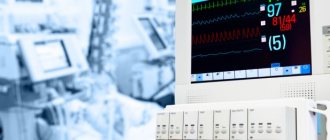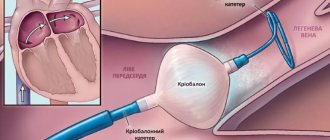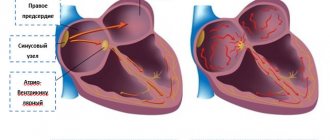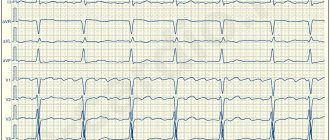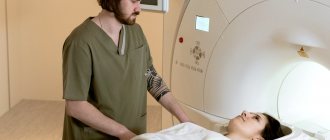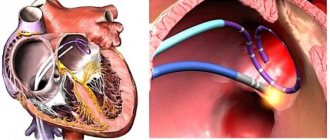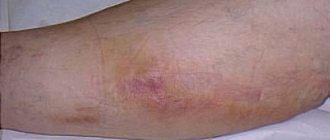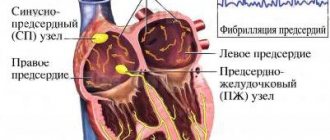Life after surgery
Recommendations for patients after radiofrequency catheter ablation of atrial fibrillation (AF):
- Observation by a cardiologist (therapist) at the place of residence;
- Limiting physical activity for 2 weeks;
- Control of daily monitoring of ECG (CMECG), echocardiography after 3 months at the place of residence;
- Taking Warfarin or new oral anticoagulants (Pradaxa, Xarelto, Eliquis) for at least 3 months, possibly up to 6-12 months, with a permanent form of AF - lifelong use;
- Taking antiarrhythmic drugs (AAP) for at least three months;
- If paroxysmal AF occurs, call an ambulance 03, take an ECG;
- After surgical treatment of AF, the effectiveness of the operation is not assessed for three months. At this time, sensations of interruptions in the work of the heart, discomfort, and possible rhythm disturbances may persist. In 10-15% of patients, AF paroxysms persist after three months; a repeat consultation with an arrhythmologist may be required to decide whether a repeat procedure is necessary.
About RFA surgery
Radiofrequency catheter ablation, or RFA, is a minimally invasive treatment for abnormal heart rhythms (arrhythmias).
The procedure has been used in cardiac hospitals since the 1980s. This method has become an effective alternative to both drug therapy and complex surgical operations. It is possible to eliminate the pathological focus that causes disruptions in the normal functioning of the heart using physical influence. Therefore, there are several types of ablation:
- radiofrequency – carried out using high-frequency currents. It is the most effective because during the procedure, healthy tissues are not injured, but scarred, the myocardium regenerates on its own;
- Ultrasound is a very common procedure; the patient does not feel pain during the procedure. The impact on the affected area occurs using ultrasound;
- laser - the pathological focus is eliminated using a beam that causes a burn and leads to the formation of a scar. Sometimes repeated conduction is required to stabilize the myocardium;
- cryoablation - exposure of the affected area using liquid nitrogen. The modified tissues are frozen at low temperatures down to -80 °C.
The main advantages of radiofrequency catheter ablation include:
- minimal risks. The operation is performed using an endovascular catheter under fluoroscopy control and, if necessary, a 3D cardiac reconstruction system. There is virtually no risk of complications with RFA, since the operation is performed through small punctures in the main veins or arteries using minimally invasive surgical technologies.
- high efficiency. During ablation, the effect is achieved through the targeted impact of high-frequency current on arrhythmogenic areas of the heart. As a result, the pathological impulses that sent the arrhythmogenic substrate of the heart are blocked, and the heart rhythm is normalized. According to statistics, many heart rhythm disturbances can be eliminated 100%. Radiofrequency catheter ablation can also neutralize damage and achieve complete recovery.
- maximum comfort. Regardless of the RFA method and surgical technology, each patient is provided with maximum comfort and safety during treatment.
Reviews of the RFA procedure performed at the Medical Innovative Phlebological Center
Review of radiofrequency ablation of veins from our patient
Vasily Tomchuk, 38 years old, Moscow, December 11, 2021
My review of RFA surgery combined with miniphlebectomy on the veins of the right leg, for people who are about to undergo a similar operation or for those who need information about what it is and what it is eaten with. I would be glad if my review helps someone make decisions. I will answer any questions. This email address is being protected from spambots. You must have JavaScript enabled to view it. I don’t know when I got varicose veins, because... he didn't bother me. But about six months before the operation, the leg began to noticeably swell at the bottom near the bone and a black spot appeared. I had to make an appointment at the clinic with a surgeon. An ultrasound showed disappointing results, second degree varicose veins. I looked at the reviews on the Internet. I went through a similar procedure in several clinics to understand where to have the surgery. The choice of where to have the operation was made according to several criteria: the attentiveness and professionalism of the surgeon, treatment of the client in the clinic itself, price. Based on all of the above, I decided to have the operation performed by phlebologist Artem Yuryevich Semenov. The operation had to be done quite quickly, since trophic changes had already begun. I was scheduled for surgery in mid-May. Before this, you need to undergo tests and obtain doctors’ opinions according to the list. Recommendations include not heating your leg, applying Lyoton (troxevasin), taking Detralex, and wearing compression garments. After receiving the test results, you must transfer them to the surgeon. Since I took the tests at the same clinic where my operation took place, I did not have to transfer the results. They were automatically directed to the doctor. The only thing I want to mention is that the tests are valid for a limited time, so they are done shortly before the operation. Before the operation, it is necessary to treat the operating area - at home the day before! I had to shave my right leg and right groin area. Peculiar sensations. Took a long time. It's easier for women). It is necessary to come to the operation in loose clothes and shoes, so the leg will be in a bandage, which will greatly increase its volume. And after the operation you need to walk. The operation was performed under local anesthesia and lasted about an hour and a half. RFA itself does not cause any pain. But during the second part of the operation - miniphlebectomy, some discomfort is felt from the anesthesia injections and the removal of the veins themselves. But all this is so insignificant compared to the result obtained. Immediately after the operation, I got to my feet and walked to the ward. There I rested for about half an hour and received a discharge letter with recommendations for further treatment. Afterwards we had to walk for about 40 minutes. The next day they changed the dressing. I would like to express my deep gratitude to the phlebologists Artem Yuryevich Semenov for the operation. Good luck to everyone preparing for surgery. I recommend not putting it off to those who need it. Vasily, 38 l, Moscow. This email address is being protected from spambots. You must have JavaScript enabled to view it.
Review of RFA of veins, complicated by thrombophlebitis
Belousov A.A., Michurinsk, Tambov region, December 11, 2016
Many thanks to the surgeon-phlebologist Artem Yuryevich Semenov for the skillfully performed operation. In April 2013, I underwent radiofrequency obliteration with Varadi miniphlebectomy on my left leg. Varicose veins appeared on my legs while I was still at school. Now I only regret one thing: I didn’t know about this doctor earlier. The operation lasted only 50 minutes and I did not experience any pain. I left the clinic on my own two feet, and the next day I went to work. Currently I feel great, my leg doesn’t bother me at all. I thank Dr. Semenov for getting me back on my feet!
Review from our patient about the RFA procedure: Arina, 26 years old, Kashira.
I would like to share my experience regarding the treatment of my varicose veins using radiofrequency ablation. I began to experience obvious signs of varicose veins when I was 20. On my mother’s side, all women suffered from this scourge. And although my mother’s legs looked absolutely terrible, she never felt pain, and therefore did not see a doctor. I very quickly got the feeling that there were huge stones tied to my feet. Pain was added to the heaviness in my legs. Sometimes I couldn’t sleep at night, not knowing how to lie down to make it feel at least a little easier. I convey my gratitude to the specialists. I had radiofrequency surgery on veins in both legs. The operation was completely painless. How happy I was to see my legs immediately after the operation: the enormous thickness of the protruding veins literally disappeared before my eyes. In the first couple of days there was some kind of unpleasant sensation in my legs, but you can hardly even call it pain. I continue maintenance treatment with medications and will be going to my beloved doctor Vladimir Vyacheslavovich Raskin for follow-up examinations. Arina, 26 years old.
Patient's review of the radiofrequency procedure: Elena, 45 years old, Moscow.
I am 45 years old. I have worked as a salesperson all my life, with breaks for vacations and maternity leave. Of course, in the evenings after work my legs were very tired. Gradually, swelling and spider veins began to appear. I didn’t go to the doctors, I foolishly hoped for chance. But over the years it only got worse. Terrible blue stripes of veins with terrible nodes appeared. A friend who was treated in your clinic and was satisfied with the result of the treatment advised me to contact you. After passing all the tests and examining my veins, I was prescribed RFA. At first I was very afraid, because, as I understood, they would simply burn out the vein. But Dr. Dmitry Anatolyevich Fedorov reassured me and convinced me that this was the most painless method. In addition, I have heart problems, I didn’t really want to do vein operations under general anesthesia, but with RFA they do the usual anesthesia of the area. In general, all my fears were in vain; an hour and a half after RFA I was already at home. Not only has the nagging pain and heaviness in my legs gone, now I don’t have to hide my legs under a long skirt and tight tights. I express my gratitude to all the staff of the phlebology clinic. Thank you and bow to you from the bottom of my heart. Elena, 45 years old.
Contraindications for RFA
The operation has no absolute contraindications: radiofrequency catheter ablation is performed for arrhythmia and other pathologies listed above, even in the elderly and children. However, RFA is undesirable for such pathologies as:
- serious condition of the patient;
- inflammation in the heart;
- kidney dysfunction;
- respiratory failure;
- pregnancy;
- blood clotting pathologies;
- advanced arterial hypertension;
- elevated temperature;
- stage of active endocarditis;
- blood clots in the heart;
- high blood pressure.
Preparing for radiofrequency catheter ablation
In order for the RFA operation to be successful, it is important for the patient to prepare for ablation:
- pass all necessary tests. Before ablation, it is necessary to take biochemistry (total protein, creatinine, urea, total bilirubin, direct bilirubin, glucose, pancreatic amylase), a general clinical blood test, a general urinalysis, a blood group test, a Rh factor, a test for HIV, syphilis and hepatitis , detailed coagulogram, ADP platelet aggregation, Pro-BNP, CRP, troponin;
- undergo a stress test, ECHO-CG, Holter monitoring, 12-lead ECG and cardiac MRI with contrast to find the source of arrhythmia, chest x-ray, endoscopy, ultrasound of the brachiocephalic arteries, ultrasound of the arteries of the lower extremities, ultrasound of the veins of the lower extremities, FVD, ultrasound of internal organs, coronary angiography;
- refuse medications. 2-3 days before surgery you should stop taking hormonal, hypoglycemic and antiarrhythmic drugs;
- carry out hygiene procedures. Be sure to shave the hair in the areas where the catheter will be inserted - in the groin or armpit;
- 12 hours before ablation, the patient should not eat; 8 hours before ablation, the patient should refuse water. Before the operation it is necessary to do a cleansing enema.
Since 2013, the Federal Scientific and Clinical Center of the Federal Medical and Biological Agency of Russia has operated a cardiology department for the treatment of cardiac arrhythmias (arrhythmias). We provide high-tech specialized medical care to patients and do everything possible so that the patient can return to a full life as soon as possible. The center is equipped with the latest generation medical and diagnostic equipment for the most accurate results. Therefore, you can do all preoperative studies and tests in our clinic.
Signs of arrhythmia
The danger of arrhythmia is that a person may not be aware of its presence for quite a long time. But the sooner you see a doctor, the easier it will be to cope with this condition. However, with arrhythmia, the patient may experience the following:
- Palpitations: you may feel that the heart is beating too fast or, conversely, slow, or the beats are uneven;
- Dizziness, feeling of weakness;
- Feeling of heaviness in the chest, pain;
- Rapid breathing, shortness of breath;
- Loss of consciousness
For patients with arrhythmia, a healthy lifestyle with sufficient physical activity and opportunities for rest, and a rational, balanced diet are highly recommended. The diet should contain foods containing potassium and magnesium: honey, dried apricots, pumpkin, zucchini, walnuts. It is necessary to maintain psychological comfort, avoid stress, and prevent excess weight gain.
If you are interested in RFA in Moscow, contact our doctor at Medis, you will receive services at the highest level and one of the most famous cardiac surgeons in the world - arrhythmologists. Within 2-3 days after the procedure you will be able to return to your normal life. Treatment of arrhythmia in Moscow at Medis is safe, reliable, effective, high-tech.
Call or write to us to ask all your questions, find out the exact price of RFA of the heart, or sign up for a consultation or examination. The only salvation from arrhythmia is RFA surgery.
Carrying out RFA
Radiofrequency catheter ablation is performed using either local or combined anesthesia.
After anesthesia is performed, a vein or artery is punctured, through which diagnostic catheters are connected to the patient’s heart. These catheters are used to perform cardiac electrophysiological studies (EPS). With EPI, it is possible to establish the localization of the arrhythmogenic substrate of the heart and give the patient an accurate diagnosis.
Then, in the same way, a “therapeutic” catheter is inserted into the heart, the tip of which is supplied with a high-frequency current for a targeted effect on the source of the arrhythmia.
In some cases, to facilitate the surgeon’s work and to diagnose arrhythmia, a 3D reconstruction of the heart chambers is performed, which can be used to visually assess how electrical signals pass through the heart, as well as take into account the anatomical features of the heart chambers.
or
Currently, new technologies are emerging for the treatment of cardiac arrhythmias. For example, several years ago, the method of cryoablation of pulmonary veins for atrial fibrillation was introduced into routine practice. A distinctive feature of this procedure is that instead of a point catheter, a balloon catheter is inserted into the heart, into which nitrous oxide is supplied, cooling the tissue to -80 ° C. This causes cryodestruction of heart tissue. This ablation method has proven itself to be a faster and safer method of treating atrial fibrillation.
The department employs experienced doctors, many cardiologists are candidates and doctors of medical sciences. Our specialists are constantly developing, taking part in international conferences, and publishing research results in leading scientific journals.
Patient reviews
Valery Miron: The first time I went to the hospital with arrhythmia was in an ambulance, it was the 4th city. It was terrible, the young doctor learned how to treat me over the phone, asking my uncle the professor how to treat him (me). Then she told me that she was only treating me because I had small children. In the morning I escaped, fortunately the attack was over. This was my very colorful acquaintance with the modern low-grade version of metropolitan medicine. Before that, I had only been to the hospital in the early 90s. After that, I decided to prepare and the next time the ambulance took me to L2. Everything there was on the level. After this second time, I decided not to risk it and went to see Dr. Sergeev for ablation. The surprise for me was that the operation lasted a very long time, as the doctor said, it was one of the longest duration records. But everything went well, the success statistics are high and I got into it. You should go into surgery believing in success, otherwise it’s hard to go. The surprise for me was that I remained on the pills forever. But there have been no attacks for a long time and they may not happen again. But as the doctor said, after many years there may be a need for a new operation. But these are the realities, it’s not bad, it’s just how it is in reality.
After operation
After radiofrequency ablation, the patient is transferred to the ward. For the first 24 hours, the patient is given rest and bed rest is recommended. This is necessary so that the heart is rebuilt in a new way, and also so that wounds in the area where the catheter is inserted do not open. On the first day, the patient is given an ECG every 6 hours to monitor the condition. On the second day, you are allowed to move slowly around the ward, the load should increase gradually.
The patient is observed in the hospital for the first three days and is under the constant supervision of our specialists. If there are no complications, the patient is sent home for outpatient recovery. Before discharge, the cardiologist examines the patient, writes out prescriptions and gives him a reminder about what needs to be done during the rehabilitation period.
In the first week, it is important that the patient is completely at rest and does not engage in usual activities that require concentration. It is best when relatives or a hired medical professional are with the patient during this period.
The full recovery period lasts about 2-3 months. At this time it is necessary:
- avoid physical activity (no running, jumping, or carrying heavy bags over 10 kg);
- avoid stressful situations;
- avoid temperature changes (you can’t take long hot baths, go to the sauna, or harden yourself);
- adhere to a diet (exclude salt, sugar, fatty and fried foods from the diet. Include boiled food, fish, lean meat, fresh vegetables and fruits in the menu);
- to refuse from bad habits;
- take medications as prescribed by a doctor (in rare cases, antiarrhythmic drugs and anticoagulants may be prescribed).
The next appointment with a cardiologist should be 3 months after the operation, then after 6 and 12 months.
Recovery after RFA is entirely patient dependent. Remember to follow the instructions in the leaflet and visit your cardiologist promptly.
